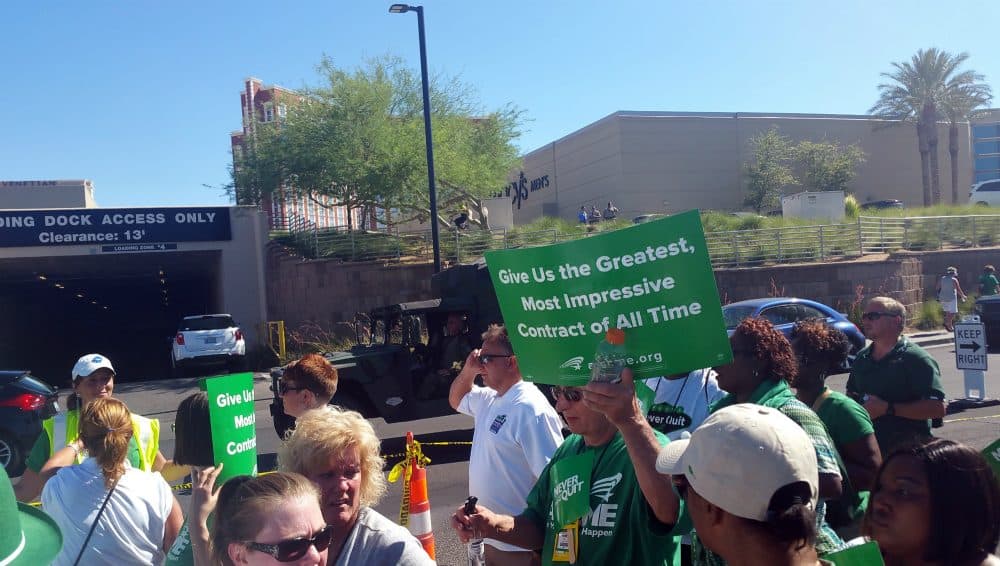Advertisement
Who Really Speaks For American Workers?

Donald Trump's claim, at the Republican National Convention, to be the voice of American workers "who work hard but no longer have a voice," wasn't just preposterous — Trump has a history of fighting his workers' efforts to unionize. It wasn't just insulting to the very workers for whom he presumes to speak. It was ignorant.
Since the New Deal, a core principle of American labor policy — indeed, a fundamental principle of international labor relations — is that workers should have the right to be their own, independent voice at work. The only large industrialized country that believes and acts otherwise is China, where the official trade unions are an arm of the state and the Communist party. That seems to be the direction Donald Trump wants to take U.S. labor relations — a Donald-knows-best, top-down approach. Woe to the workers who might challenge his dictate of what they want and need.
More than 20 years ago, a national commission...concluded that American labor law was failing to deliver on its promise to provide workers the ability to form a union and gain access to collective bargaining.
Trump is not just wrong-headed about U.S. labor, he is out of step with the majority of Americans. A 2015 Pew Research poll reported that 62 percent of Americans agreed that restaurant workers should be able to unionize. This number rises to over 70 percent for public employees and to 82 percent for manufacturing workers.
Unfortunately, Trump’s statement reflects the reality of worker voice in America today: Employers have more to say about whether or not workers are heard at work than do the workers themselves.
The problem has been decades in the making. More than 20 years ago, a national commission on The Future of Worker Management Relations, on which I served, concluded that American labor law was failing to deliver on its promise to provide workers the ability to form a union and gain access to collective bargaining. A deep ideological divide between business and labor, and a Republican-controlled Congress, doomed any chance of labor law reform.
In 2008, a study by John Paul Ferguson, an assistant professor at the Stanford Business School, revealed that only one in 10 efforts to form a union between 1999 and 2004 under the National Labor Relations Act’s election processes managed to make it to the first step — the successful negotiation of a contract if management strongly opposed the union.
The next president and Congress must be committed to fixing and updating America’s labor laws to get wages rising again, reflect workers' wants and needs, and make the U.S. competitive in a global economy.
An essential starting point: Provide workers the ability to join a union of their choice and gain access to collective bargaining. This is a core promise of U.S. labor policy.
Today’s workforce doesn’t want to have to fight their employer to improve their working conditions. They want a cooperative workplace where they contribute to improving performance and customer service and then share fairly in the profits they help achieve. A second element of a new labor policy, then, should be to endorse and support labor management relations practices that support good companies and good jobs.
Today’s workforce doesn’t want to have to fight their employer to improve their working conditions.
Labor law also needs to be extended to cover the growing number who fall outside the classification of “employee.” These include those that work for contractors, such as many hotel housekeepers and call center workers; those in franchised arrangements, such as many McDonald’s restaurant workers; and those working as independent contractors, such as drivers for Uber and Lyft. These workers have as much need as regular employees to have a voice in determining the conditions under which they work and to share in the profits they help produce. That is why McDonald’s workers are protesting in many cities and Uber drivers are forming networks, and, in cities such as Seattle and New York City, are attempting to bargain.
Indeed, there is an enormous amount of creative experimentation emerging around the country with new approaches to worker voice. The fight for a $15 minimum wage is the most visible example. Others include worker entrepreneurs who are developing apps to support workers in finding good quality jobs, mounting petitions to change conditions with their current employer, and using social media to mobilize public support for their efforts to improve or save good jobs. These experiments might well yield models of worker voice created by the workers themselves, not ventriloquist employers or politicians presuming to speak for them.
